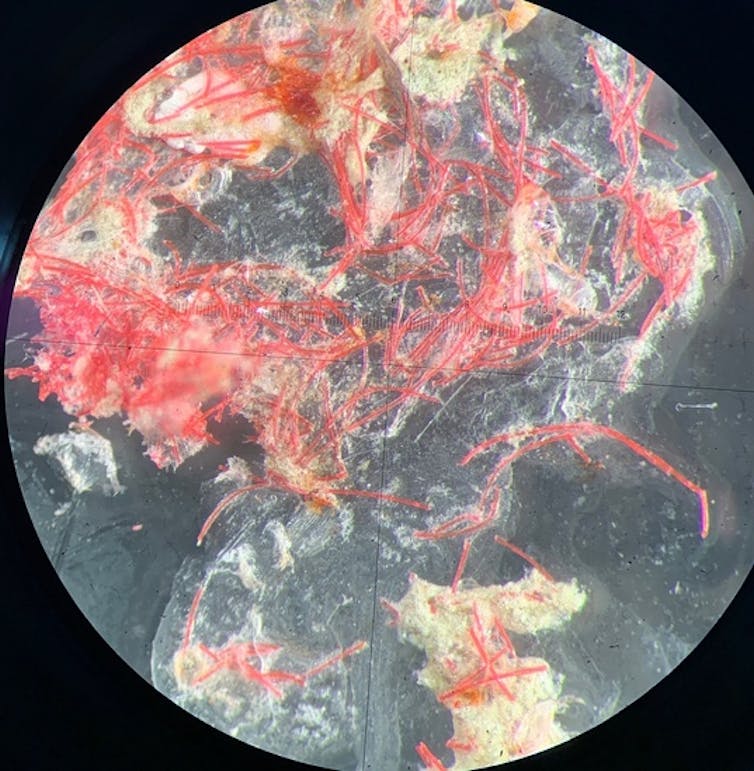
By Judith Weis
Microplastics are turning up everywhere, from remote mountain tops to deep ocean trenches. They also are in many animals, including humans.
The most common microplastics in the environment are microfibers – plastic fragments shaped like tiny threads or filaments. Microfibers come from many sources, including cigarette butts, fishing nets and ropes, but the biggest source is synthetic fabrics, which constantly shed them.
Textiles shed microfibers while they are manufactured, worn and disposed of, but especially when they are washed. A single wash load can release several million microfibers. Many factors affect how many fibers are released, including fabric type, mechanical action, detergents, temperature and the duration of the wash cycle.
My research focuses on coastal ecology and water pollution, including work in New York and New Jersey marshes and estuaries that are heavily affected by human activities. Here are some things to know about reducing microplastic pollution from your washing machine.

NOAA Fisheries
From fabric to water and soil
Once garments release microfibers in washing machines, the fibers enter the wastewater stream, which generally goes to a wastewater treatment plant. Advanced treatment plants can remove up to 99% of microfibers from water. But since a single laundry load can produce millions of fibers, treated water discharged from the plant still contains a huge number of them.
Microfibers that are removed during treatment end up in sewage sludge – a mix of solid materials that is processed to remove pathogens. In many cases, treated sewage sludge is applied to soil as a fertilizer. This allows microfibers to enter air and soil, and to be transferred to soil organisms and up the terrestrial food web or taken up by crops.
Microplastics that wash into rivers, lakes and bays can have many harmful effects. They may be consumed by fish and other aquatic animals, affecting their biochemistry, physiology, reproduction, development or behavior. These microplastics contain chemical additives, including substances like phthalates and bisphenol A that can leach out and may have health effects in humans and animals, including effects on the endocrine system.
Textile microfibers also contain additional chemicals that have been shown to be toxic, such as fabric dyes, anti-wrinkle agents and flame retardants. In addition, contaminants that are present in the water, such as metals and pesticides, can stick to microplastic particles, turning them into a veritable cocktail of contaminants that may be transferred into animals that eat them
Washing more sustainably
Not all fabrics shed microfibers at the same rate. A loosely woven fabric that feels fluffy or fuzzy, such as fleece, sheds more than a tightly woven one. While garments made of natural fibers, such as cotton and wool, would appear to be a solution, unfortunately they also shed microfibers that can pick up pollutants in the environment.
Some textile scientists and manufacturers are developing fabrics that shed less than existing ones, thanks to features such as longer fibers and coatings to reduce shedding. Meanwhile, here are some ways to reduce microfiber shedding from your laundry:
- Do laundry less often. Washing full loads instead of partial loads reduces release of microfibers because garments are exposed to less friction during the wash cycle.
- Use cold water, which releases fewer microfibers than hot water.
- Use less detergent, which increases microfiber release.
- Use a front-loading washing machine, whose tumbling action produces less microfiber release.
- Dry laundry on a clothesline. Running clothes in dryers releases additional microfibers into the air from the dryer vent.
Several types of products collect microfibers in the washer before they are released with wastewater. Some are laundry bags made of woven monofilament, a single-polyamide filament that does not disintegrate into fibers. Laundry is washed while enclosed in the bag, which traps microfibers that the garments release. A study of one such product, Guppyfriend, found that it collected about one-third of released microfibers.
Another device, the Cora Ball, is a plastic ball with spines topped with soft plastic discs that capture microfibers. It reduces microfibers by about 25% to 30%, but may not be suitable for loose knits because it can snag on threads and damage clothing.

Samsung U.S., CC BY-ND
Filter your washwater
Several brands of external filters are available that can be retrofitted onto existing washing machines. External filters can remove up to 90% of microfibers from rinse water. Their average cost is about US$150. Owners need to clean the filters periodically and dispose of the collected microfibers with other solid waste, not down the drain, which would put them back into the wastewater stream.
In a 2021 study, researchers installed washing machine filters in 97 homes in a town in Ontario, Canada, which represented about 10% of the households in the community. They found that this significantly reduced microfibers in treated water from the local treatment plant.
Some companies are now manufacturing washers with built-in microfiber filters. France has enacted a requirement for all new washing machines to be equipped with filters by 2025, and Australia has announced that filters will be required in commercial and residential washers by 2030.
In the U.S., a similar requirement was passed by the California legislature in 2023, but Gov. Gavin Newsom vetoed the bill, saying he was concerned about the cost to consumers. An economic study commissioned by Ocean Conservancy found that filters would increase the price of washing machines by only $14 to $20 per machine. Several states are considering regulations that would require filters in washers.
In my view, requiring manufacturers to add filters that can trap microfibers to washing machines is a reasonable and affordable step that could rapidly reduce the enormous quantities of microfibers in wastewater. The eventual solution will be reengineered textiles, which won’t shed, but it will take some time to develop them and move them into clothing supply chains. In the meantime, filters are the most effective way to tackle the problem.
![]()
Judith Weis is Professor Emerita of Biological Sciences at Rutgers University, Newark.





























Duncan says
Great read. $14 – $20 is nothing to the added cost of a washer. We need to step up the level of seriousness when it comes to protecting our environment.
Make it a manufacturing requirement today.
Endless dark money says
Republicons think the corporations will pave the way not regulations. So one day after ExxonMobil has made enough profit they will address their toxic pollution haha. Remember when Dow put Teflon in the blood of every living human; they had to pay like 20 million in fines for that and made 2.5 billion a day. Still waiting on them to clean up the Teflon haha. Don’t worry they changed company names so they cant be held liable like that again. Toxic companies are big donors to toxic candidates like racist ron or orange Jesus.
JimboXYZ says
As it is, Nike recycles plastics for sports clothing fashion. Polyester & anything plastic strikes again ? Doing your laundry is going to be a quantified & monetized source of pollution.
melly says
Nobody needs to regulate washing machines any more than they need to regulate gas stoves.
Enough, already!
Ed P says
Can anyone say Social Panic? Or at the very least social anxiety? Can we expect Greta Thunberg to take up the cause?
Shit, now I’m ruining the environment by washing my clothes! Use less energy, walk, or bike, eat more vegetables, save water and plant another tree. No more gas stoves, don’t use your dishwasher. No more natural gas hot water tanks, or gas driers. My lawn mower and weed wacker are a problem. Yikes, what’s next, should I sell my Hawker 800? No, not until John Kerry sells his Gulfstream G-IV…oh no he just did in July.
Well, at least I have a septic system at the house and hopefully only polluting my and my neighbors yards.
Endangered species says
You mean my 4 dollar tshirt shipped from china isnt good for the environment? Im sure those industrial producers will use those profits to help save global water systems and animals right? Didn’t racist ron already ban ESG investments? Well enjoy your toxic water till cancer comes then hopefully you have money for healthcare. It’s almost like toxic concentrations are increasing and gop are decreasing funding and abilities of the EPA. Maybe the chemicals we don’t test for will cancel them out right?
Endangered species says
Don’t regulate Tide it could reduce their profits. If only every American didn’t wash their clothes this wouldn’t be an issue. So it’s up to you to wear dirty clothes and save the planet haha. Oil companies do the same narrative change. Let’s continue to do nothing as we’re not sure of the long term effects higher environmental pollution will have.